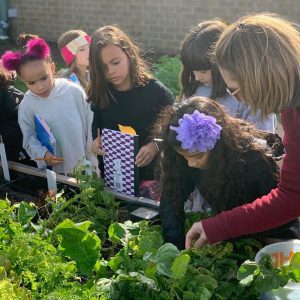Celebrate National Farm to School Month
From taste tests in the cafeteria and nutrition education activities in the classrooms, to farm visits and school garden harvest parties, join the celebration!
Read More How many students at your school know where the sweet potatoes on their lunch tray come from? Farm to school is a national movement that helps connect kids to healthy, local food while also supporting local farmers and building communities. Farm to school initiatives can happen in the classroom through nutrition lessons and field trips to farms, in the school garden, or in the cafeteria by serving locally grown food for breakfast or lunch.
How many students at your school know where the sweet potatoes on their lunch tray come from? Farm to school is a national movement that helps connect kids to healthy, local food while also supporting local farmers and building communities. Farm to school initiatives can happen in the classroom through nutrition lessons and field trips to farms, in the school garden, or in the cafeteria by serving locally grown food for breakfast or lunch.
Want to start a farm-to-school program at your school? Get started!
Activities such as these help students explore…
Social Awareness: Connecting with a local farm to teach about the sources of students’ food provides students an opportunity to explore new perspectives on food and society. Children can develop understanding of agriculture and the greater affect it has on their community’s health by engaging in Farm to School conversations.
Responsible Decision-Making: It is much easier for children to understand the importance of knowing where their food comes from when they can place a local farmer’s name or face with their food. Farm to School initiatives teach children ethical responsibility while forming deeper connections to one’s community.
October is National Farm-to-School Month. Coordinate your efforts to make the most of the resources available during this month.
Integrate farm to school language in your district or school wellness policy.
Apply for a grant to help start a program at your school or receive support to maintain existing initiatives.
Engage volunteers by inviting a local farmer to teach students about locally-sourced foods or asking parent volunteers to chop fruits and vegetables for a taste test, build planter beds, or help with garden maintenance and harvesting.
For more activities and ideas like this one, be sure to sign up for our news and updates. And if you like what you see, please donate to support our work creating more ways to help build a healthier future for kids.
Categories: Nutrition & Healthy Eating, At School, Digital Resource